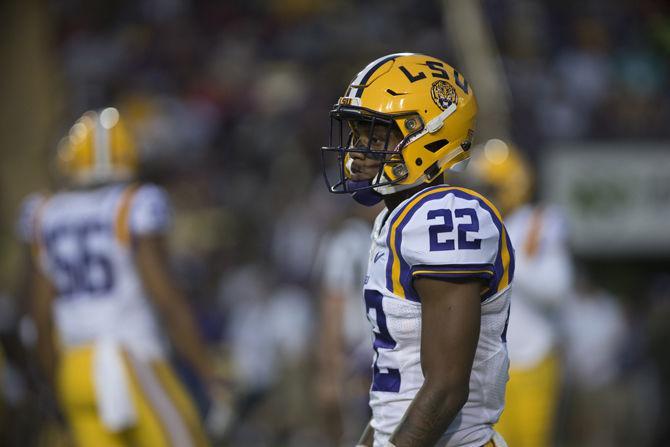Most of us learn the difference between right and wrong at a young age.
It’s wrong to throw a rock at your grammar school crush on the playground. It’s right to finish your plate of food — including that side of bland vegetables your mother eagerly included with the meal.
When we’re young, right and wrong are as black and white as the print in a newspaper, but as we grow older, black and white often meld together to create gray.
Throwing rocks at people is still plainly wrong, but what about pulling a harmless prank on a roommate for playing music too loudly?
Welcome to the gray area.
To further complicate the ideas of right and wrong, there are also special moments where there are only examples of wrongdoing.
That leads us to the curious case of LSU cornerback Kristian Fulton.
Fulton is highly-touted junior who has seen meager playing time in his collegiate career. A five-star recruit out of high school, many fans were expecting the Metairie, Louisiana, native to contribute to the defensive secondary early in his career, but this has not been the case.
Fulton saw action in the Tigers’ 2016 campaign when he entered as a substitute in two regular season games and the bowl game, but he was suspended with a dozen other players for the 2017 season opener.
However, unlike the other suspended players, Fulton sat out the remainder of the 2017 season. The reason for this lengthy suspension was unknown to the general public until news broke early last week.
In a column by The Advocate’s Ross Dellenger, it was revealed that Fulton is in the process of serving a two-year suspension for multiple infractions in the NCAA drug-testing protocol.
Fulton was suspended one year for attempting to use a fraudulent testing sample and another year for allegedly failing the test, according to the column.
If it’s true that Fulton tried to cheat himself using performance-enhancing drugs and cheat the system by using a fraudulent sample, then it’s true that the Tiger defensive back is doubly wrong.
But, what about the NCAA? Was it wrong to suspend Fulton for two calendar years?
Many, including Fulton’s lawyer Don Jackson, believe so.
“The NCAA suspending this young man for two full competitive seasons is unethical, and there are due process issues relative to the collection of the test specimen,” Jackson told The Advocate.
Although Jackson wouldn’t divulge in the specifics of the case, the Fulton family plans to submit a request for reconsideration on the basis of the “clearly observed tampering” clause in the NCAA rules.
If such a clause is defined literally, as it should be when discussing topics of legality, Fulton may have a legitimate gripe.
Unless there is an NCAA official who can serve as a first-hand eyewitness to any observed tampering, there’s not enough evidence to satisfy the burden of proof laid out in the rule book.
Not only would the NCAA be severely penalizing Fulton on an unsubstantiated hunch, they would also be unjustly punishing an entire football program.
LSU currently has four scholarship cornerbacks on the roster, and keeping another off of the roster without concrete proof of specific wrongdoing would represent a systematic failure on the part of the NCAA.
There’s a fine line between imposing a punishment that fits the crime and burdening wrongdoers with “overly punitive” consequences.
Fulton may have been in the wrong to start off this whole debacle, but the NCAA is wrong to kneecap a college kid’s athletic career without some form of due process.
Column: Due process questions raised in battle between NCAA, Fulton
March 19, 2018
LSU sophomore defensive back Kristian Fulton (22) during the Tigers’ spring game on Saturday, April 22, 2017 at Tiger Stadium.
More to Discover







